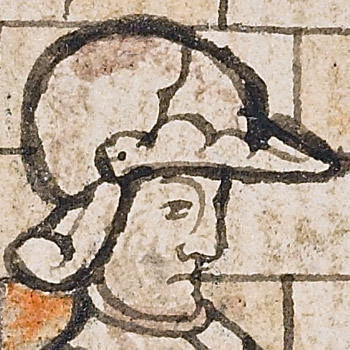Sir Degare
General Information
Plot Summary

The widowed King of Litel Bretaygn declares that no one can marry his daughter unless they beat him in a tournament. On the anniversary of his wife’s death, his household attends mass at an abbey in a nearby forest. On the way, the princess becomes lost and is raped by a fairy knight. He announces that she will bear a son, then gives her a broken sword and leaves. She rejoins the group at the abbey and they return home.
When her pregnancy begins to show, the princess worries that people will think the child is her father’s. She gives birth in secret and leaves the infant outside a hermitage with gold, a pair of magic gloves which will only fit her, and a letter. The hermit christens the child Degare and gives him to his sister, the wife of a merchant, who raises him as her own. When he is ten Degare rejoins the hermit and is educated in ‘clergie’ until, at the age of twenty, he is shown the letter and gloves. Vowing to find his family, Degare fashions a staff from a sapling and sets off.
Soon after, he rescues an Earl from a dragon. The Earl takes him to his castle, where Degare tries his gloves on all the women, without success. The Earl knights him and he continues his journey until he hears about the King of Litel Bretaygne, who is still defeating his daughter’s suitors. Degare enters the city and challenges the king: after a long battle, he is declared victorious and is immediately married to the princess.
When they are about to go to bed, Degare suddenly remembers his gloves. He bemoans his oversight, and his new bride realises that she is his mother. She puts on the gloves and, when they fit, confesses her pregnancy to her father. When he has heard the story of his conception, Degare asks where he can find his own father and his mother/ wife gives him the fairy’s sword. The next day he rides deep into the forest, asks for lodging at a mysterious castle. He is ignored by its female inhabitants, but during a silent dinner he falls in love with their beautiful mistress. He follows her into her chamber, where he is lulled to sleep by music. In the morning, the lady wakes Degare and rebukes him for not guarding her maidens: a knight is trying to abduct her and has slain all her father’s men. She offers to marry Degare if he can defeat her suitor, who at that moment attacks the castle again. Degare is victorious and the lady invites him to stay. He refuses but promises to return after a year.
Degare rides on through the forest until he encounters the fairy knight, his father, who challenges him. They fight until Degare draws his broken sword, upon which his opponent recognises him and produces its missing point. At Degare’s request, they both return to his mother, who is divorced from her son and married to his father. Then they all travel to the castle in the forest, where Degare is married to the lady.
From: Anne Laskaya and Eve Salisbury, The Middle English Breton Lays. Kalamazoo, University of Western Michigan for TEAMS, 2005.
Manuscript: Edinburgh, National Library of Scotland MS Advocates 19.2.1 (Auchinlek).
Manuscripts
Click a title below to search for all romances in that manuscript.